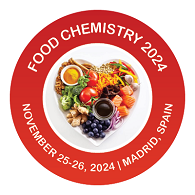
Ghada Alzyadi
Saudi Food & Drug Authority (SFDA), Riyadh, Saudi Arabia.
Title: The evaluation of the level of the hormone residues in food supplements
Biography
Biography: Ghada Alzyadi
Abstract
Recently, there has been interest in detecting the presence of hormones in sports and food supplements, with commercial claims that promise to improve athletic performance, muscle growth and increase bone and muscle density. Additionally, the use of hormones in sports and food supplements has become a subject of increasing concern due to potential health risks and ethical considerations. Furthermore, hormones can be classified as hormones produced by human bodies and animals are called internal or natural hormones, on other hand, synthetic hormones refer to artificially produced compounds that imitate the behaviors of natural hormones, the risks associated with artificially produced hormones underscore the importance of thorough research, stringent regulation, and ethical considerations in their development and use. For these reasons, this study is investigating four hormones (19-Nortestosterone, Medroxyprogesterone, Progesterone and Testosterone), in 21 sports supplements obtained from Saudi markets and different brands using liquid chromatography-tandem mass spectrometry (LC-MS/MS). In this study a method was followed and validated at the same time, which used liquid extraction followed by centrifugal and evaporation steps, to extract hormones from sports supplement samples. The LOQ and LOD were 2.10 µg/Kg, and 6.38 µg/Kg for samples, and the recovery was ranged from 80% to 110%. As a result, Progesterone was found in 8 samples, of which 4 samples are higher than the LOQ value, and the concentration of these samples are (13.21, 6.66, 12.89 and 8.82 µg/Kg). Therefore, ongoing monitoring of sports supplements, may be crucial for maintaining good health and should be considered in relation to anti-doping compliance. Consequently, the SFDA seeks to enhance regulation and increase control of sports supplements.

